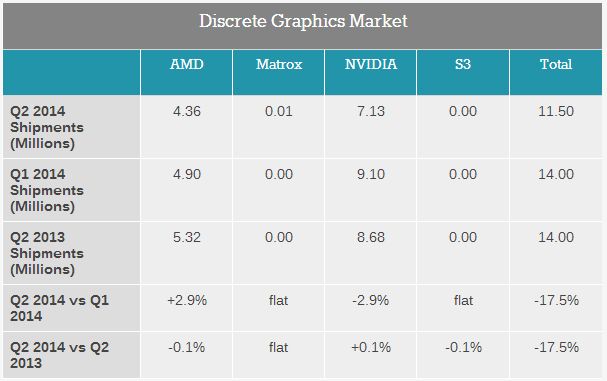The latest data from Jon Peddie Research shows the status of the market for graphics cards and embedded graphics in personal computers. Looking at those numbers is an excellent way to gauge the healthy of the PC gaming business, because for the most part only gamers will be buying graphics cards for a PC. This year’s second quarter was, usual for graphics cards, weaker than the first quarter, with a drop of 17.5 percent.

The total number of add-in graphics card shipped in the second quarter was 11.5 million, with both AMD and Nvidia losing ground compared to the previous quarter. AMD’s cards dropped 10.7 percent in sales from the previous quarter, and Nvidia’s cards lost 21 percent in sales — but Nvidia still holds a substantial lead in the market, with 62 percent market share compared to AMD’s 37.9 percent share.
The interesting part about the graphics card market for PCs is that most PCs ship with Intel integrated graphics, so add-in cards aren’t really necessary for many purposes. In fact, the attach rate of GPUs to PCs is 139 percent, reflecting the fact that many PCs have both integrated graphics and an add-in card. AMD also supplies integrated graphics with their processors, as well Intel, but Nvidia does not. Thus the market share numbers look different when integrated graphics are considered, with AMD reaching nearly 18 percent of PCs, Intel with 67.3 percent, and Nvidia with only 14.72 percent. When Steam members were surveyed, the numbers were different, reflecting the nature of the Steam audience as core gamers: For Steam users, AMD had 29.8 percent of the market, Intel had 18.85, and Nvidia had 50.93 percent, or just over half the market.

In general, Nvidia is more successful than AMD at selling add-in graphics card, with a more than two to one advantage over AMD. While Intel has improved its integrated graphics performance, any PC gamer will want to see the significant upgrade in graphics that comes with an add-in card, even with the additional cost. Compared to the latest Xbox One and PS4 graphics, a mid-range graphics card with a good CPU should be capable of producing better graphics, which is something many PC gamers will continue to desire.
Source: Anandtech
